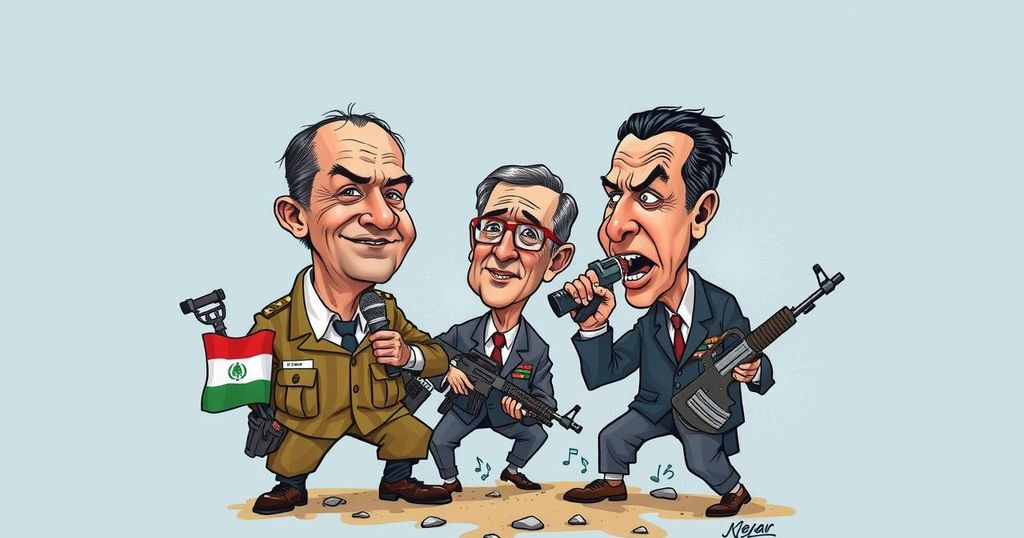Qatari Media’s Intensified Anti-U.S. Campaign During Gaza Conflict
Qatari media has recently intensified its anti-American rhetoric, featuring cartoons that portray the U.S. as complicit in Israel’s military actions in Gaza. These illustrations depict the U.S. as a demonic figure and a puppet of Israel, exacerbating regional tensions surrounding U.S. foreign policy in the Middle East.
In recent months, Qatari media, both in Qatar and London, has been characterized by a series of overtly anti-American cartoons that vilify the United States and accuse it of facilitating Israel’s military actions in Gaza. These cartoons often depict the United States as a demonic force that is complicit in Israeli aggression, presenting scenes where the U.S. is portrayed as controlling Israel or actively collaborating in attacks on Gaza. Notably, some have referred to the United States in derogatory terms, labeling it the “cursed Uncle Sam” and accusing it of being a major perpetrator of terrorism. Reflecting this sentiment, articles within Qatari press also express aspirations for military retaliation against U.S. forces. One article in the daily Al-Watan explicitly called for Iran’s allies to target U.S. troops stationed in the region, suggesting a desire for the U.S. to face humiliation and defeat. The cartoons in question depict various narratives: The United States is illustrated as a criminal entity that wields power over global affairs while instigating violence and conflict. Instances depict members of the U.S. Congress as wolves applauding violence in Gaza and portray U.S. Presidents as complicit in the military actions taken by Israel. Other illustrations depict the U.S. providing military and political support to Israel, presenting a narrative where the U.S. aids in the bloodshed occurring in Gaza. This includes imagery where political backing from America is symbolized by graphic scenes underscoring Washington’s role in legitimizing Israeli military actions. Furthermore, several cartoons suggest that the United States is not only supporting Israel’s aggression but is also depicted as being under Israeli influence, where candidates for U.S. presidency are portrayed as puppets under Netanyahu’s control. Overall, the Qatari media campaign illustrates a significant effort to critique and vilify U.S. involvement in the Israeli-Palestinian conflict, portraying the U.S. as a primary antagonist rather than a peace-keeping entity. In essence, the rhetoric utilized in these publications indicates a profound discontent with U.S. foreign policy and its implications for the conflict in Gaza.
The Qatari media’s anti-U.S. campaign coincides with heightened tensions in the Israeli-Palestinian conflict, particularly in light of recent military actions in Gaza. The portrayal of the U.S. in Qatari press reflects broader regional sentiments regarding American foreign policy, particularly its support for Israel. The Qatari government and its media apparatus have positioned themselves as proponents of Palestinian rights, often criticizing foreign entities, especially the United States, for perceived complicity in Israeli aggression. This environment has fostered a media landscape where cartoons and articles serve as tools for political expression and dissent against U.S. involvement in the Middle East.
In summary, the Qatari media’s anti-U.S. campaign manifests through a barrage of hostile cartoons and articles that characterize the United States as a primary instigator of violence against Palestinians in Gaza. By depicting the U.S. as both complicit in and controlled by Israeli actions, the Qatari press articulates a narrative that aims to delegitimize American foreign policy and express solidarity with Palestinian struggles. This strategy reflects an ongoing sentiment within the region that seeks to hold external powers accountable for the escalating humanitarian crises and promote a narrative that centers on Palestinian rights.
Original Source: www.memri.org




Post Comment